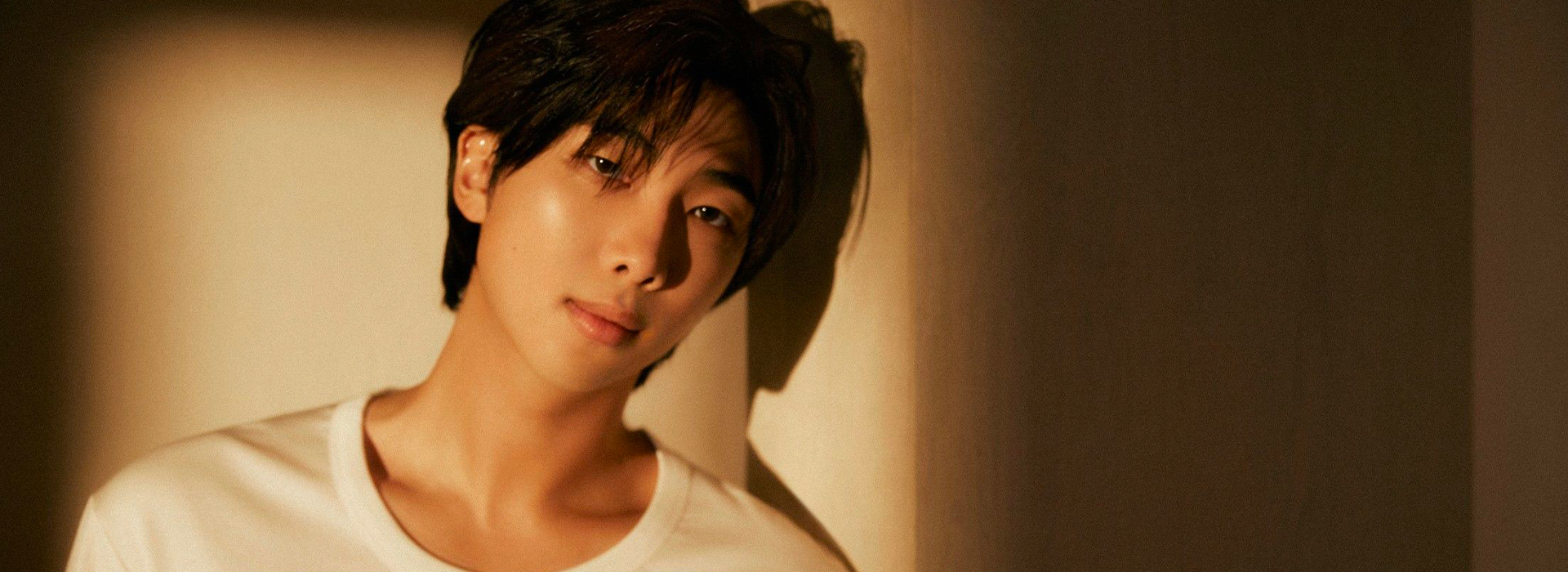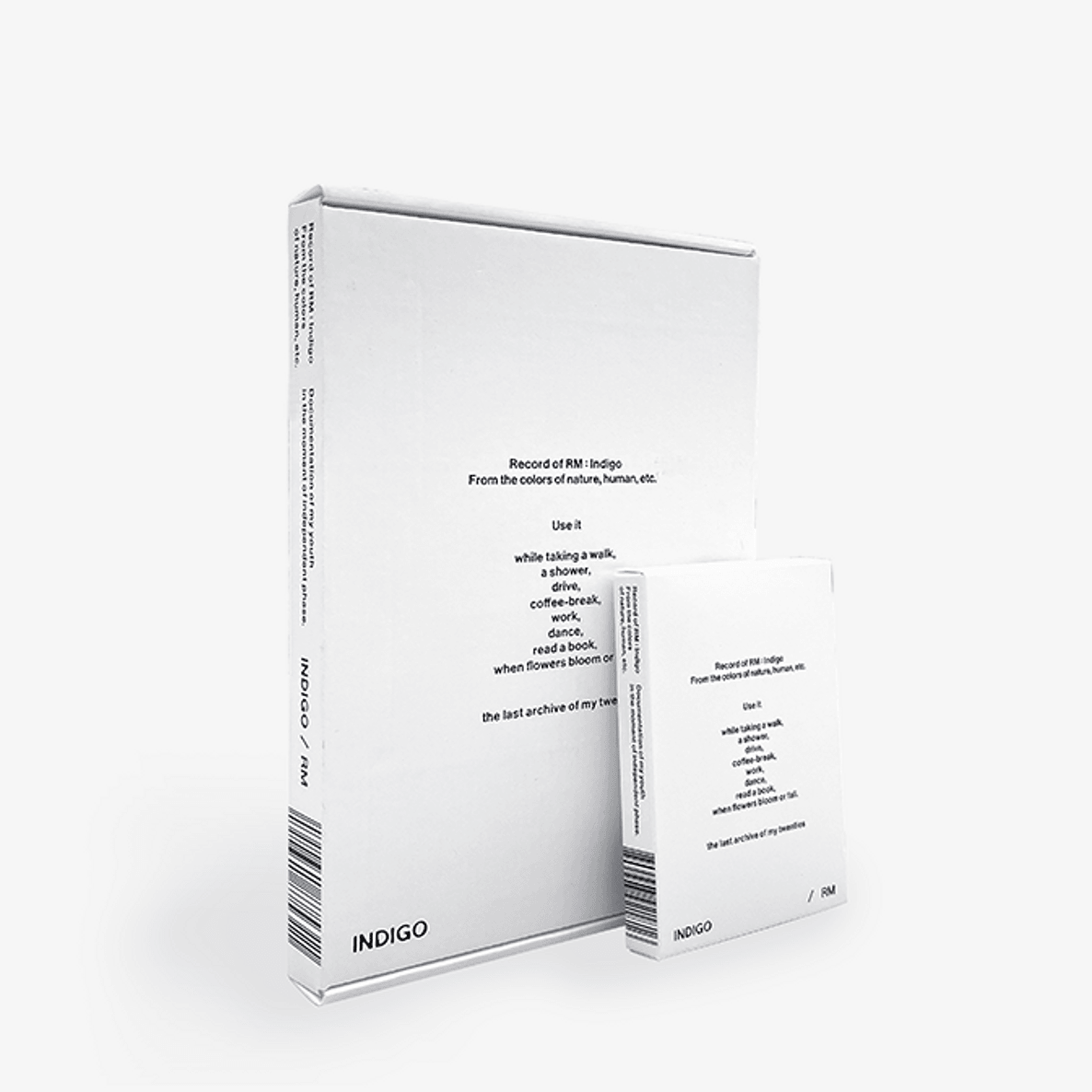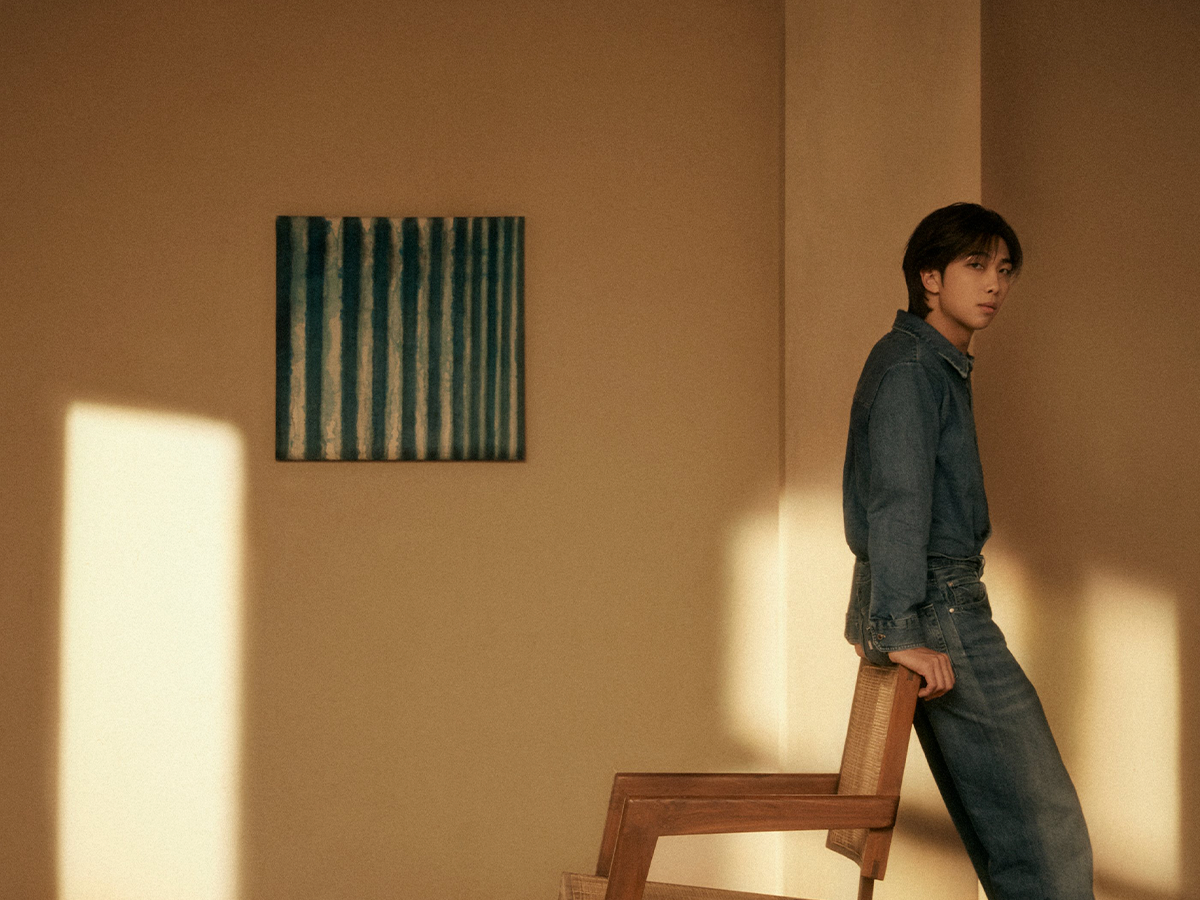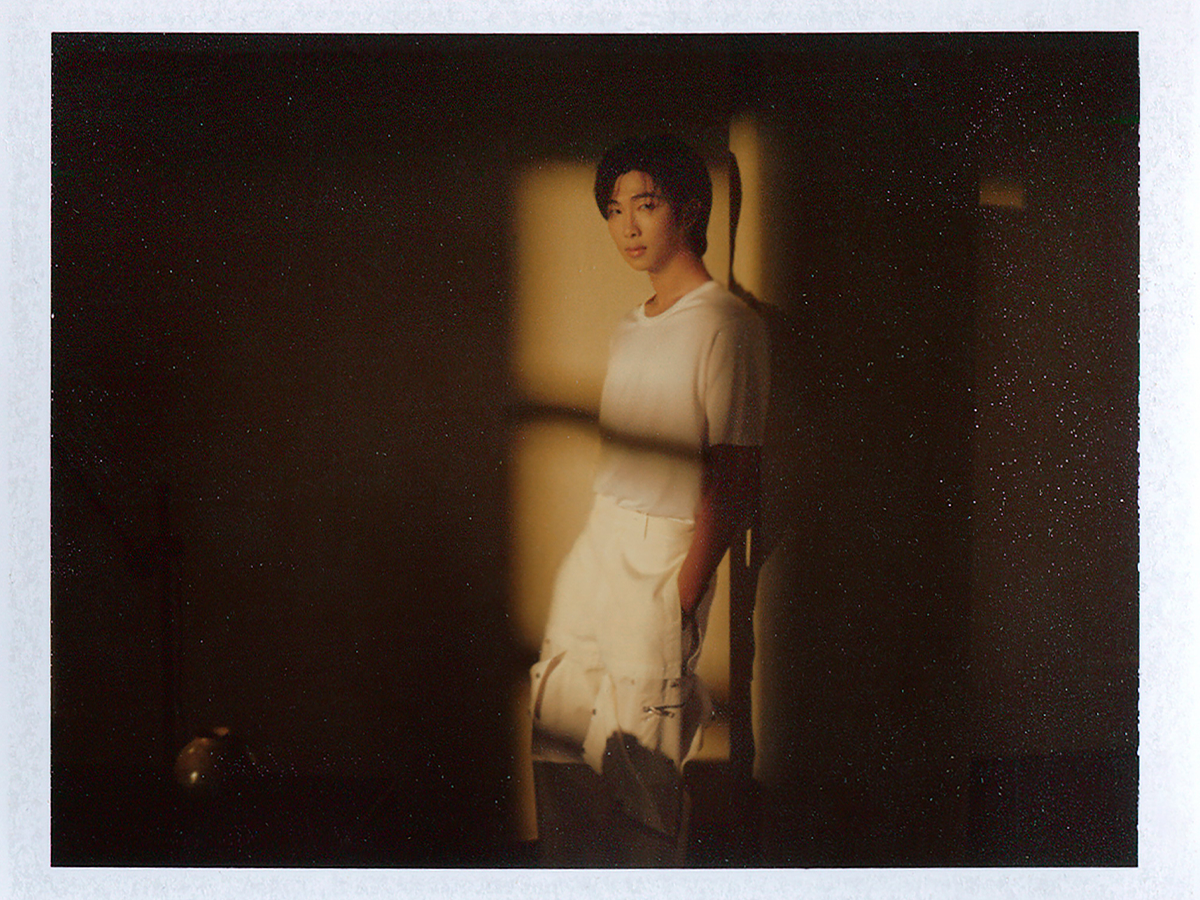
In the magazine film for his first solo album Indigo, RM explains how the title for “Yun” (with Erykah Badu), the first track off the album, came from the late artist Yun Hyong-keun. It’s been well-established over the last few years that RM has a great interest in art and especially Korean artists like Yun—in both their work and in the artists themselves. When asked in a Weverse Magazine interview about the “conclusion” that’s come about from “how much you’ve studied art,” RM explained that he wants to “approach something that’s timeless.” Taking a look at his response now, it seems the lives and output of those masters at their craft may have instilled in him a desire to make his mark with a piece that aims for everlastingness, even if it meant going at a slower pace. But he’s pursuing that everlastingness in his life as a member of BTS. Lyrics from “Yun” like, “You’re actually nothing without the team,” and, “You’re trying to take the highway to the backroad,” seem to refer to the way people have viewed RM when working as part of BTS.
In RM’s world, everything moves fast and changes just as quickly. As he says in the song, “Finger pointed at me now points to the mountain telling me to go there.” That’s why he needs his own “speed and direction,” and, as the snippet from Yun at the end of the track named after him suggests, the reason RM looks for Tao in his life as a person and as an artist: “Rid yourself of all greed. You must be free of greed, and enter the world of innocence. That’s what I want to do, but can’t. But I’ll keep trying till the day I die. That, I believe, is a person’s purpose.” But RM is now 28 years old. It makes sense that he would say something like, “I don’t know the truth that you told me about,” in “Yun.” Is it possible for someone as young as RM to “always be a human first” and “not think about making art, just play,” in Yun’s words? The first words out of RM’s mouth after the snippet of Yun in the intro show which way the rapper’s compass is pointed: “Fuck the trendsetter.” His heart agrees with Yun but physically he’s still a twentysomething raised on hip hop. He’s achieving continuity through a conflict between acceptance of Yun’s ideas and opening his own album with the word “fuck.”
Erykah Badu makes an appearance in the song “Yun.” Following on Yun’s words, Badu sings briefly about where living a humanistic life can lead to: “You keep the silence / ‘Fore you do somethin’ / You be a human / Till the death.” Before she ever sings, though, RM raps, “Still I dream of something forbidden / I do dances nobody sees.” The idea of RM exploring what a person should pursue until the day they die is likely something no one in the pop music industry could have expected in their wildest dreams. So when Badu sings after this, it feels like a response from this revered singer to RM’s worries, or even the voice of God himself as he appears before a mortal human in their time of need. Badu seems to sing as if revealing a way of life that can only be achieved once reaching a high point, imparting knowledge to a young superstar finding his way in a secular world. At times, such teachings and material values clash against one another. All the attention and judgment RM receives as a member of BTS from the outside world can also be enough to launch him into a fit of rage. He reveals that all of these things are whirling around inside him. His defiant attitude toward trends (“fuck the trendsetter”) continues into “All Day” (with Tablo) (“fuck the algorithm”); sometimes he directs an outburst specifically toward people who point fingers at him unconscionably, as in “Still Life” (with Anderson .Paak) (“It’s always the fools putting their lives on the line for the online”). Being a member of BTS, he can even show some swag just by stating a dry fact (“Baby I buy time with money”). Yet he shows the direction he’s pursuing in his life within all the conflict, and does so in the same song, saying he’ll become “the unstopping still-life” and “blooming once again my flower.” Through this, we can see that these three tracks—“Yun” (with Erykah Badu), “Still Life” (with Anderson .Paak) and “All Day” (with Tablo), which RM described in the first part of the album’s magazine film—are all intimately connected to the rapper’s musical foundation. “Yun” is old-school boom bap, “Still Life” is classic funk and RM said in the film that he made “All Day” in a style reminiscent of Dynamic Duo. Tablo, who appears on the last of those, was RM’s hero when he was a teenager. RM takes the music of his younger years—a scene he eventually entered himself—and its musical foundation and uses it to rap about his own journey to the hip hop beat: a man who reflects on what he can learn from the greats, is sometimes pushed to anger, sometimes wants to show off and still keeps moving in the direction he calls forward. He can do anything with hip hop—his roots—but he also reveals the truth: that it’s hard for him to move in any direction.
The second section of Indigo is made up of five songs: “Forg_tful” (with Kim Sawol), “Closer” (with Paul Blanco, Mahalia), “Change pt.2,” “Lonely” and “Hectic” (with Colde). Each one shows different sides of RM as a modern man living in modern times. Like what RM had revealed in the video, each song conveys his feelings like love(Closer (with Paul Blanco, Mahalia)), change of people and the world(‘Change pt.2’), sentiment he felt in the hotel during Las Vegas concert((‘Lonely’) and things he feel when he come back home alone (‘Hectic (with Colde)’)). As RM explains in the magazine film, the songs cover topics like love (“Closer”), the changing world and its people (“Change pt.2”), how he felt sitting in the hotel while in Las Vegas for a concert (“Lonely”) and how he felt when he came back home alone (“Hectic”). Then, in the song “Forg_tful” (with Kim Sawol), he imprinted both his age (“26”) and what he was feeling at the time he wrote it. The experiences and emotions are rarely consistent. It only makes sense—that’s life. But on Indigo, RM takes his emotions and experiences and puts them all into the same context. The three songs in the first section connect Yun in the past and RM in the present in linear form; the next five spread RM’s experiences and his related thoughts across a broad surface. These two different approaches give RM the power to imbue Indigo with a three-dimensional look at the inner workings of the artist’s mind.
In “Forg_tful” (with Kim Sawol) RM portrays himself as an otherwise ordinary young man who keeps forgetting things even though he “is only 26 years old” and how his friends berate him for it. This seems to show a conflict between one side of RM and the side of him presented in the songs up to and including “All Day” (with Tablo) where he’s going to make a path for himself. But being compelled to sing lines like, “I’m only 26,” “I don’t have enough memory,” and, “I can’t not go to the park,” suggests that’s the side of him that has experienced the world as a member of BTS. He has experienced so much as a member of the group that he can’t possibly remember everything that happens each day—so much that he even has to get out to the park just to organize his thoughts. mono., his second mixtape, is full of such contemplative moments. The feelings he experienced from moment to moment seem to flow throughout the album from start to finish. The difference in Indigo is that those thoughts lend themselves to a process of personal reflection. The backdrop to RM’s aspirations is his life as Kim Namjoon as he probes his own feelings in parks, hotels and late-night streets. Indigo integrates Kim Namjoon the man, RM the artist and the separate leader of BTS and spreads the three of them across the entire album, connecting his personal reflection to the music.
The shift from “All Day” (with Tablo) to “Forg_tful” (with Kim Sawol) is as stark as their respective featured artists, moving from old-school Korean hip hop to a key artist in the Korean indie scene. “All Day” does wrap up with RM quietly repeating the hook, however, and his voice seems to drop off suddenly at the very end, ushering in something of a calmer atmosphere. This makes for a more natural segue into “Forg_tful,” and the mellow acoustic guitar that opens it. Earlier, in “All Day,” RM sings, “When the cruel world, oh, seems like it’s laughing at you / No matter what they say, we fly.” He sings this in a contemplative voice following the explosive hook in the second verse. Sudden mood changes are a staple of K-pop that ready the listener for the climax to follow later in the song. The tension typically drops suddenly after the chorus following the second verse, only to rise again as it reaches the most exciting and impassioned part of the song. In “All Day,” this comes after RM laments a world that only ever seems to follow trends presented by the “algorithm,” showing respect instead for those of “us” who follow our own paths “no matter what the world says” and therefore might deserve a extravagant crescendo, but RM stops short of such fulfillment here. Not only is RM struggling with the direction his life’s taking but the decision serves a musical purpose as well as the clear contrast actually connects this track better to the one that follows.
Just as “Yun” (with Erykah Badu) opens and closes with the late artist’s voice, RM starts and finishes “Still Life” (with Anderson .Paak) with the same exciting rap hook. The way the emotion in the first three tracks rises and falls seems to suggest it’s constrained within certain limits. They progressively rise higher until the album moves on to “Forg_tful” (with Kim Sawol), entering a section in which the five tracks to follow open up and express more and more passionate emotions. In “Closer” (with Paul Blanco, Mahalia), Blanco sings about lovers discovering their differences; in “Change pt.2,” RM mulls pessimistically about how everyone inevitably changes as an abrasive synth and piano fill the track. That chilly, rigid feeling carries over into “Lonely,” a raw confession of the loneliness he felt in his hotel room while on tour, crying out that he’s “fuckin’ lonely” and feeling trapped there. This track, too, ends with him calmly repeating the spoken-word chorus. “Hectic” (with Colde)—a city pop song, according to what RM says in the magazine film—plays on the emotional atmosphere where “Lonely” leaves off. The languid atmosphere emphasizes RM’s echoing vocals to create a calming presence, giving the listener the impression of a walk in the deserted streets of night or simply contemplating the dark scenery outside the window. There is nevertheless a hint of rock in the song, lended by the brisk rhythm running throughout and the deep, powerful hook that opens it (“Yesterday was a hectic”). Indigo works within a different genre on each track, ranging from hip hop to folk and expressing different emotions in unique atmospheres, but RM has divided the album into three sections as one might divide a play into acts, with each song sophisticatedly arranged to slowly push each individual section to its own climax while leading the entire album to one unified crescendo.
If you listen to the album in its entirety, it becomes clear why “Wild Flower” (with youjeen) was chosen as the lead single. Cherry Filter vocalist youjeen pours her heart and soul into the hook, effectively bringing the slow emotional buildup RM works on throughout the previous eight tracks to a head to wash them all away. The decision to put the emotional outpouring of “Wild Flower” so close to the end of the album places importance on the track but also benefits the album as a whole. In “Yun” (with Erykah Badu), “Still Life” (with Anderson .Paak) and “All Day” (with Tablo), RM is troubled and torn between the life path presented by the greats and the man he is today; in “Forg_tful” (with Kim Sawol), “Closer” (with Paul Blanco, Mahalia), “Change pt.2,” “Lonely” and and “Hectic” (with Colde), he conveys the thoughts and feelings he feels in everyday situations. After all this, he finally shares what he has discovered: that, because “nothing was ever meant to be mine,” he’ll follow a philosophy of “burning fireworks to flowerworks.”
This is where the album’s impressive lineup of featured artists—an amazing list even before hearing their contributions—really makes the album shine. Without youjeen, “Wild Flower” wouldn’t have been the climax that it is. It’s her explosive vocals and the aura surrounding her time as the singer for rock band Cherry Filter that bolster the song’s mood and make the climax possible. Kim Sawol’s style seems to represent where Korean indie music is headed and her appearance on the folksy “Forg_tful” not only shows off her vocal prowess but also symbolizes how Indigo deviates from today’s mainstream music. We also hear Erykah Badu repeating a short melody in an almost mystic way in “Yun” as though guiding RM through life, and Anderson .Paak shouting, “I’m still life” in his characteristic way in “Still Life” like he’s talking to RM directly and supporting him. And Tablo, no longer simply RM’s hero but his musical collaborator, agrees with his peer on “All Day” as they criticize the homogenization of tastes in a lengthy rap (“Individuality stomped out by think tanks / Personal impact frozen over”). Tablo is a naturally talented hip hop artist who’s been putting his life into raps long before RM ever put his own pain into words on Indigo. Tablo’s career has been as full of praise and honors as it has been misunderstandings and criticism. Even the way he jumps into the track—“what’s up with the mood here?”—is powerful. His rap in “All Day” keeps listeners on the edge of their seats, dropping lines like, “Light a bigger fire, your life’s one big match,” and, “Haters, go ahead and close your eyes if you don’t wanna see my life / It’s always hard to see dreams with your eyes open.” His words draw from his own experiences as an artist to give RM an uncanny power that extends to everyone listening as well. RM is a tireless archaeologist of music and art and he clearly understood these artists’ histories and their importance in their respective artistic scenes when he invited them to be a part of his creation, setting up the perfect space for them to explore their performances in.
“Hectic” (with Colde) starts out softer and slower, gradually increasing in tempo and volume and growing in emotional intensity as RM hoarsely carries the melody forward. He seems to be wandering in the night, but when Colde’s soft vocals come in, the song switches to calm nighttime contemplation instead. In the magazine film for the album, producer Pdogg described the song as being about when “you come home alone [in a taxi] in the middle of the night [and] you feel empty.” RM said it captures the feeling of saying things like, “I’m gonna have the worst hangover tomorrow,” while on the way home, and Colde called the song an “incomplete story of our youth.” As RM puts it, the song recalls things like “neon signs, cell phones, buildings, taxis, the Olympic Highway” and other things in its sound that are otherwise hard to put into words but something that young people living in the city no doubt understand. He takes city pop and infuses it with rock, then juxtaposes his vocals with Colde’s to develop conflicting interpretations stemming from the title “Hectic.” The shared emotions brought out by the young artists featured across this second section of Indigo are all too familiar in the city, to all twentysomethings and to RM himself. It’s difficult to pin it to one distinct emotion, but whether love or loneliness, there is a switch to self-contemplation by refusing to push those emotions all the way out and swallow them instead.
Looking back on RM’s 10 years as a member of BTS, he’s been through a lot. Lyrics like, “Everyone here is actually full / With all these thorns / And the morning that inevitably comes / Let’s numb ourselves in our own ways” (“Forg_tful”) even feel like someone who’s had no other option but to endure all the hardships life has thrown at him throughout his youth. But he sings it all calmly over an acoustic guitar and tosses out a passing suggestion on how to chip away at such problems every day (“I can’t not go to the park”). “Closer” (with Paul Blanco, Mahalia) is mainly an English song, but Blanco does sing in Korean at points, translating to, “This’ll be enough for me … As long as I have your love.” There is nuance behind Korean Canadian Blanco switching to Korean in the middle of an English-language song to calmly address the love of his life to say that this is plenty. It’s a sentiment that resonates as the soundtrack to twentysomething city dwellers the world over. The genres RM draws from for each of the tracks on Indigo are as varied as the artists who appear on it but the entire album is unified through careful composition that emphasizes the emotional connection he has with the other artists. Each song is in its own genre—if it’s possible to define the genre at all—but they consistently explore the emotions of people in their 20s living in the city and gaining insight through deep contemplation as they enter not into the world but into their own. The most distant appraisal of the world and the people who inhabit it on the album comes in “Change pt.2,” which rips into Indigo with synths in the first half but transitions into lyrical keys toward the end. RM, too, changes from harshly accenting each syllable of his vocals to something gentler. As with many of the other songs here, RM’s subject matter turns into a monologue directed at himself.
This is where Indigo sets up a paradox: RM has created an album that has to be listened in full from beginning to end and consumed as a whole in order to understand the context and intention behind the spectrum of tracks that draw from an array of genres and artists both past and present. The intricate approach to production not only takes on a nearly impossible task but does so with songs designed to be part of a greater whole that each make thoughtful use of the strengths of their featured artists to form one cohesive creative work. The final product shows how much attention RM pays to the world of music, his natural sensibilities and taste and what caliber of producer he must be in order to pull it all off in a single album. This is an artist who used every last one of his plethora of musical assets to follow his own path rather than outside trends and created the quintessential soundtrack to twentysomethings living their lives everywhere in the world today, capturing their emotions and their style with shrewd insight. As what amounts to a compilation of different genres unified by one cohesive emotion, it’s a ready playlist for anyone who sympathizes with the sentiment that runs throughout. Although Indigo is an album that puts RM’s internal monologue on public display, it can be understood within the context of the trends found in the world he finds himself in. Because of that, Indigo may not reveal a complete and everlasting RM, but it’s certainly a contemplation on who he is today. By singing about himself, RM’s album brings its accompanying artists, people his age and the rapper himself into emotional synchronization.
Indigo’s third and final section is made up of two songs, “Wild Flower” (with youjeen) and “No.2” (with parkjiyoon). youjeen and parkjiyoon each released their own hit songs in the past, back when music like that didn’t yet have the label “K-pop.” As an artist, RM has spent his life listening to a wide variety of genres ranging from hip hop to indie, but as a teenager he also spent time listening to what back then was simply called “pop.” Indigo concludes with help from two artists who no doubt were a part of his life back then. youjeen’s performance in the climactic “Wild Flower” has her tone and style written all over it. The song, which also serves as the album’s lead single, also encapsulates the very essence of RM, born and raised in Korea as he was. He strays as he considers his life and music but he never forgets where he’s from and ultimately lands on his feet there. “No.2” (with parkjiyoon) sees RM looking back on himself as “a kid hungry for any kind of approval” and tries to comfort that younger version of himself (“You tried your best”). If Erykah Badu was the one who allowed a younger RM to pursue his dream of joining the greats, it must have been parkjiyoon who was there to comfort RM through headphones when the outside world was telling him, “You’re not that special.” And now, once again, she comforts him with her emotional vocals. RM has managed to express himself through endless contemplation and countless songs, and his new album resists becoming bogged down by trends, opting instead for something more universal. But it all boils down to a young man growing up enough that he can look back at himself as a child who was told he’s not special and bring himself solace with the lyrics, “Those words don’t make me cry anymore.” In other words, RM has grown up. As he says in “Yun”: “A bit of a better adult.”


Unauthorized reproduction and distribution prohibited.
- The musicians on RM’s Indigo: Part one2022.11.25

- The musicians on RM’s Indigo: Part two2022.11.26
